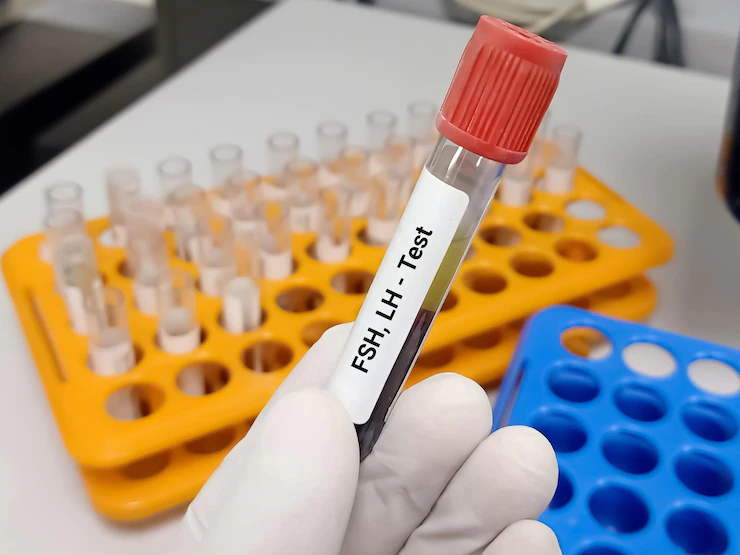What is an LH test?


Related products
Testosterone is a key male sex hormone, and its production is tightly regulated by the luteinising hormone. LH binds to receptors in the Leydig cells of the testes, stimulating them to produce testosterone. This hormone is critical not only for sperm production but also for libido, muscle mass, fat distribution, and mood stability in men. Without adequate LH levels, testosterone production can decline, resulting in hypogonadism, low libido, fatigue, and infertility.
Men with unexplained fatigue, reduced sexual function, or difficulty conceiving should consider checking both LH and testosterone levels to assess whether hormone imbalance could be a contributing factor. A detailed evaluation can help pinpoint whether the issue lies in the pituitary gland, hypothalamus, or testes.
The Free Testosterone Blood Test is an excellent choice for assessing bioavailable testosterone in the bloodstream. It works well alongside an LH test to provide a more comprehensive picture of male hormonal health.
In some cases, low testosterone levels with high LH levels may indicate primary testicular failure, while low testosterone and low LH suggest a problem with the hypothalamus or pituitary gland. Understanding these patterns allows healthcare professionals to provide targeted treatment strategies such as hormone replacement therapy or further endocrine investigation.
How LH levels interact with thyroid and adrenal hormones

The hormonal ecosystem in the human body is complex and interrelated. Thyroid hormones and adrenal function can significantly influence reproductive hormones like LH. The thyroid, for instance, plays a role in metabolic regulation and impacts the menstrual cycle, ovulation, and sex hormone balance. If thyroid function is impaired—either due to hypothyroidism or hyperthyroidism—LH secretion may be disrupted.
Similarly, the adrenal glands produce cortisol, a stress hormone that can suppress the hypothalamic-pituitary-gonadal axis. Chronic stress or adrenal fatigue may lead to lower LH levels, delayed ovulation in women, and reduced testosterone in men. Therefore, when LH-related symptoms arise, testing thyroid and adrenal function can provide valuable insights.
If you're experiencing irregular cycles, persistent fatigue, or difficulty managing stress, it might be worth considering the Advanced Thyroid Function Blood Test. It evaluates key thyroid hormones including TSH, T3, and T4, offering a more complete view of your endocrine function.
LH levels should never be evaluated in isolation. When reviewed in combination with thyroid and cortisol assessments, they can help identify hidden hormonal issues that may be contributing to physical and reproductive symptoms.
Monitoring LH in women seeking fertility support
For women trying to conceive, monitoring LH levels is often one of the most informative and effective steps. LH surges shortly before ovulation, signalling that the egg is about to be released. Timed intercourse or assisted reproductive procedures like intrauterine insemination (IUI) or IVF often rely on pinpointing this hormonal peak.
Women with irregular ovulation patterns, polycystic ovary syndrome (PCOS), or unexplained infertility may benefit from regular LH testing. It allows them to track their cycles more accurately, detect missed ovulations, and discuss timely interventions with their fertility specialists.
A Female Fertility Test is a practical option for women seeking to understand their reproductive hormone profile. This test includes LH as well as FSH, oestradiol, and other key fertility markers, offering a clearer picture of ovarian function and cycle regularity.
In addition to LH testing, ovarian reserve markers such as Anti-Müllerian Hormone (AMH) are important for women considering future fertility or egg freezing. The AMH Blood Test provides a reliable estimate of the remaining egg supply and can support informed reproductive planning.
These fertility-focused tests can be found in the Fertility Health Tests Collection, allowing women to build a customised hormone profile that supports their family planning journey.
LH, menopause, and hormonal changes in ageing women
As women transition into menopause, hormone levels shift dramatically. Oestrogen and progesterone decline due to reduced ovarian function, and as a result, LH and FSH levels increase in response. Monitoring LH levels during this time can help determine whether a woman has entered perimenopause or is postmenopausal.
Symptoms such as hot flushes, mood changes, sleep disturbances, and irregular periods can all be linked to changing LH and oestrogen levels. While these symptoms are a normal part of ageing, they can be disruptive and affect quality of life.
A Menopause Blood Test is helpful in determining your hormonal stage. It includes LH among other essential markers and can guide conversations around lifestyle adjustments, supplements, or hormone replacement therapy (HRT) if appropriate.
Postmenopausal women often have persistently elevated LH levels. Although ovulation no longer occurs, LH testing may still be relevant when evaluating symptoms that mimic other conditions or when ruling out pituitary issues.
Beyond menopause, women may also benefit from testing other markers related to metabolic health, including cholesterol. The Cholesterol Blood Test helps identify cardiovascular risk that may increase due to declining oestrogen, which plays a protective role in vascular health.
All of these tests can be found in the All Health Tests Collection, offering a wide range of options to build a comprehensive health profile, especially during transitional life stages like menopause.
Conclusion
Understanding your LH levels can offer significant insight into your reproductive and hormonal health, regardless of your age or gender. LH plays a critical role in regulating the menstrual cycle, stimulating ovulation, supporting testosterone production, and reflecting the health of the pituitary gland. Testing your LH levels is not just about fertility—it’s about gaining a deeper understanding of your body’s internal communication system and identifying imbalances that may affect energy, mood, libido, or metabolic function.
Whether you are exploring fertility treatments, navigating menopause, managing symptoms of hormonal disorders, or simply taking a proactive approach to your well-being, LH testing is an invaluable part of the process. It's often best used alongside other tests that provide complementary data—such as oestradiol, FSH, testosterone, and thyroid panels.
For individuals looking for a convenient way to monitor hormones and overall health from home, the Welzo Home Blood Tests platform offers an accessible and reliable range of options. With medically reviewed results, fast turnaround, and flexible testing packages, you can stay informed and make health decisions with confidence.
To go even deeper, hormonal health is often linked to sexual health and liver function as well. The Sexual Health Tests Collection includes targeted panels to rule out infections or imbalances, while the Bilirubin Blood Test assesses liver function, which plays a crucial role in hormone metabolism.
Maintaining hormonal balance is not just about treating symptoms—it’s about prevention, optimisation, and living in tune with your body’s natural rhythms. With access to accurate testing and supportive insights, you can take charge of your health with clarity and confidence.





























 Rated Excellent by 26,523+ Reviews
Rated Excellent by 26,523+ Reviews